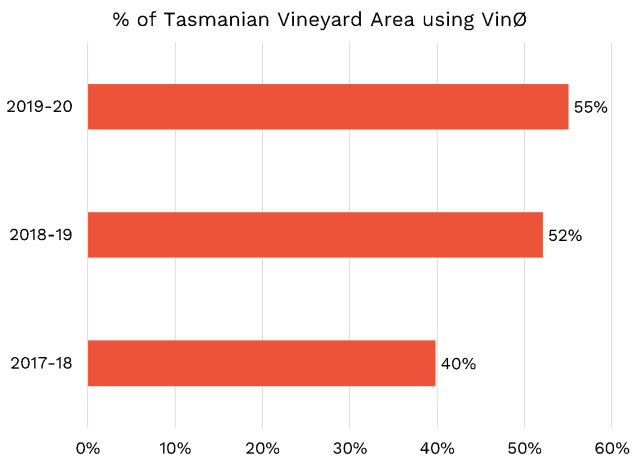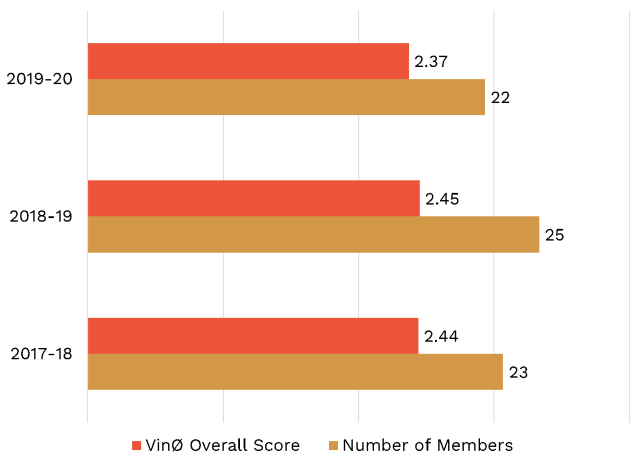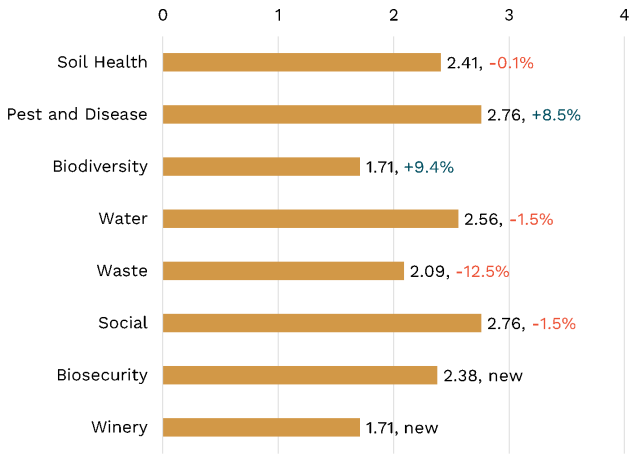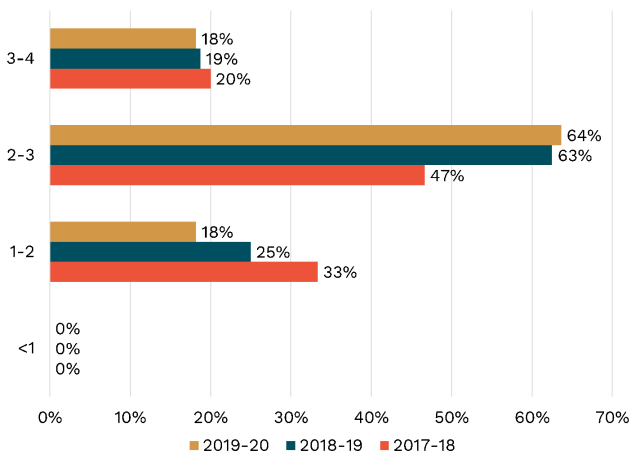VinØ 2020 - Annual Report
The VinØ ('vin zero') program is Tasmania's best management practice system, designed and tailored to assist the island's producers monitor, improve, benchmark and communicate their viticultural and winery practices.
It is a significant and important initiative, providing a user-friendly management and reporting tool. Program members each receive a detailed annual benchmarking report, which identifies areas of their business where they are performing well against best practice in addition to areas requiring improvement. It also allows them to assess their performance alongside the overall average of fellow participants.
Below is the annual report for the 2020 season, which included two new modules, Biosecurity and Winery practices.
Biosecurity practices were previously included in the 2019 VinØ Program but now have a dedicated module. It has been in recognition of the importance of this topic and in order to reduce the risks of an invasive species incursion in Tasmania.
The Winery module focusing on winery management practices, takes the program beyond the vineyard for the first time in 2020. This module aligns with the national Freshcare Winery Standards and has been reviewed by the Wine Tasmania Technical Committee to better suit Tasmanian conditions and business models.
Wine Tasmania congratulates the 2020 VinØ Champion - Pooley Wines, and the 2020 VinØ Most Improved - Cambridge Valley Vineyard!

The data...
Over half of the vineyard area in Tasmania is now managed under VinØ, with 22 vineyards completing their online workbooks.

This season, the combined average across members resulted in an overall score of 2.37 out of a perfect mark of 4.


Module Results
The program is divided into eight modules:
1. Soil Health, Nutrition and Fertiliser Management
2. Pest and Disease Management
3. Biodiversity Management
4. Water Management
5. Waste Management
6. Social (Work, Community, and Winery Relations)
7. Biosecurity
8. Winery management
Members are performing well against most of the modules, with Biodiversity Management and Winery Management providing an opportunity for improvement. These will be a focus of extension and education activities by Wine Tasmania in 2020/21.

Member Results
18% of the participants scored in the highest grades, a similar result to the previous season, with fewer members scoring less than 2. This reflects an overall improvement in member practices.


Areas in which Tasmanian wine producers are performing well:
| Soil Health - Weed Control Strategy |
| Pests - Integrated Pest Management (IPM) |
| Pests - Resistance Management |
| Pests - Grapevine Agrochemical Application Records |
| Pests - Planting Material |
| Water - Water Security |
| Water - Irrigation System |
| Water - Irrigation System Maintenance |
| Waste - Waste Agrochemical Solutions |
| People - Contractor Selection |
| People - Remuneration |
| People - Grape Composition Testing |
| People - Contracts |
| People - Grape Grading |
| Biosecurity - Biosecurity Vineyard Inspections |
| Winery - Purchasing And Delivery Of Hazardous Substances |
Areas showing an opportunity for improvement:
| Soil Health - Organic Matter |
| Soil Health - Fertiliser And Soil Additive Handling And Storage Area |
| Biodiversity - Site Audit |
| Biodiversity - Biodiversity Action Plan |
| Biodiversity - Enhancement Of Biodiversity In Our Region |
| Biodiversity - Biodiversity Monitoring |
| Water - Water Management Strategy |
| Water - Irrigation Records |
| Waste - Waste Management Planning, Monitoring And Recording |
| Waste - Waste Management Training |
| Waste - Green Waste |
| Waste - Grape Marc |
| Waste - Waste Equipment |
| Waste - Paper, Cardboards, Non-Polypropylene Plastic And Metal |
| Waste - Polyethylene And Polypropylene Plastics |
| Waste - Carbon Emissions |
| Biosecurity - Biosecurity Links |
| Biosecurity - Sign In Procedure |
| Biosecurity - Personnel Disinfestation |
| Winery - Environmental Action Planning |
| Winery - Emergency Spill Response |
| Winery - Winery Water Management Program |
| Winery - Wastewater Management |
| Winery - Biodiversity Plan |
| Winery - Air |
| Winery - Energy |
| Winery - Fuel |
2020 Members List
Wine Tasmania acknowledges the Aboriginal people as the traditional owners of lutruwita (Tasmania), our island home. We pay our respects to the Tasmanian Aboriginal community, their Elders past, present and emerging, their unique cultural and spiritual relationships to the land, water and community.

